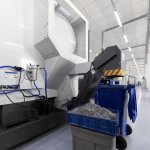
Flipkart started selling large appliances again in early 2014, nearly a year after it was forced to withdraw these products because of customer complaints about late deliveries and poor quality of products. Photo: Hemant Mishra/Mint
Bengaluru: India’s largest e-commerce firm Flipkart Ltd is banking on sales of high-priced products such as television sets, refrigerators and air conditioners to help the company maintain its sales growth trajectory this year.
Flipkart started selling large appliances again in early 2014, nearly a year after it was forced to withdraw these products because of customer complaints about late deliveries and poor quality of products. The company has set up a separate logistics network for the category.
Since early 2014, when it launched sales of TVs in Bengaluru, the company has added washing machines, air conditioners, microwave ovens and other products, and now sells these items to customers in some 6,000 pin codes across India.
In the Diwali quarter ended December, Flipkart sold nearly 500,000 units of large appliances, including 250,000 TV sets, said Amit Bansal, business head of appliances at Flipkart. This accounted for roughly a fourth of all TVs sold in India in that period, he said. The company expects to increase sales of large appliances by three times this year, compared with 2015.
“Over the next two years, (large appliances) is going to be one category that’s going to drive revenue growth for Flipkart. This category is built on customer service. The biggest lever we’re going to use is bringing down the cost of ownership, whether it’s offering high-end technology at disruptive prices or offering the kind of financial arrangements nobody has seen before,” Bansal said.
After the company’s bumper Big Billion Day sales week, some of the biggest consumer electronics brands, which were earlier hostile to all online retailers, entered talks to start selling on Flipkart, he said, but declined to name the brands.
In the past 18 months, many consumer electronics brands such as Sony, Videocon, Lenovo, Dell and Canon had warned shoppers against purchasing products on e-commerce marketplaces. However, as e-commerce became popular with consumers, brands are coming around to the reality that they can’t afford to be absent online.
“Diwali really shook up the market. It helped make brands realize that e-commerce is not just another channel, it could be the channel to growth. There is a shift happening in the mindset of brands. And we want to be the platinum partner of choice for global brands. Over the past few months, we’ve had discussions with a handful of global brands (that aren’t selling online) and things are moving in the right direction,” Bansal said.
For Flipkart, large appliances will be a key battlefront with arch-rivals Amazon India (Amazon Seller Services Pvt. Ltd) and Snapdeal (Jasper Infotech Pvt. Ltd). The average price in this category is more than 10 times that of other products.
“Consumer durables is a very interesting category for online and vice versa,” said Harminder Sahni, managing director at Wazir Advisors. “It’s standardized and branded so trust is not an issue and it’s crowded so consumers will want to compare products which e-commerce offers. This category will be important for Amazon, Flipkart and Snapdeal. Not only is it a high-ticket category, it is also not evolved online. While the three companies offer these products, no one has really cracked it. Customer experience is still not always great. So whoever is able to provide that will emerge as the winner.”
Sales of consumer durables in India are expected to touch nearly $21 billion by 2020, according to a July 2015 report by Consumer Electronics and Appliances Manufacturers Association and EY, a consultancy.
Large appliances is a nascent product category. The two biggest online product categories so far, smartphones and fashion, are already intensely competitive. E-commerce companies haven’t yet focused on sales of large appliances partly because it is particularly challenging to deliver these products quickly, consistently and in a viable manner. For instance, getting a 6-ft-high refrigerator or an air conditioner to a customer is far tougher than delivering a smartphone or a pair of jeans.
Bengaluru-based Flipkart, which is valued at $15 billion, is leading the growth of large appliances among e-commerce firms. Its dedicated logistics network for this category helps the company deliver a majority of orders for large appliances in roughly three days. It claims to deliver some 97% of orders within the time it promised customers.
Apart from setting up a separate supply chain network for this business, Flipkart is getting brands to launch TVs, washing machines and refrigerators exclusively for its customers. Some products from brands such as Vu, BPL, Sansui and Whirlpool are available only on Flipkart.
The company also bought a large stake in Jeeves Consumer Services Pvt. Ltd, which provides after sales service for large home appliances and electronics, in November 2014. Jeeves provides installation, maintenance, repairs, product guarantees and after sales services on TVs, washing machines and other products.
“The biggest piece in large appliances that defines customer experience is how well you deliver the product and how well and quickly you can instal the products. With Jeeves we’re able to give a spot-on delivery time and a spot-on installation time to customers. Earlier, the installation turnaround time was 72 hours after delivery for TVs. Now, one in five TVs sold on Flipkart is installed at the same time,” Bansal said.
[“source-Livemint”]





